- Home
- L. R. Patton
The Dragons of Morad Page 4
The Dragons of Morad Read online
Page 4
When her father had finished the chopping and moved on to a hunk of meat that a boy brought in for him, another servant appeared in the doorway.
“The king requires your presence,” the man said. He did not use her father’s name, Amos. Cora watched her father hunch his shoulders and drop his head. He was so weary. Cora did not like to see her father so weary. He turned to the servant and said, “Yes. Of course. Right away.”
And he followed the servant out the door. Cora flew to the other side of the castle, where she knew the throne room to be. This window was open, too, and she perched where those inside could not see her. She waited once more for her father to enter.
When he did, the king clapped his hands. “Cook,” he said. He did not use her father’s name, either. Did no one call the help by their given names?
“Yes, sire,” her father said when he had finally crossed the endless red carpet spread before him and dropped nearly to his knees in a bow.
One day they would be bowing to her like that, even if she were merely a princess. She would show them what power lies in kindness, and the kingdom would love her.
“It is not happy news I bring, alas,” the king said. “It is with great sorrow that I tell you we must lock down the possessions of the castle.” The king, a handsome man with dark hair and dark eyes and dark skin, leaned forward in his throne. He narrowed his eyes. “We have had reports of stealing.”
Her father tilted his head to the side.
“And because there is stealing, we must reduce our risk,” King Sebastien said. “So nothing will be carried outside the castle walls.”
The king did not seem sorry at all about this news. A smile played across his lips.
Cora watched her father straighten. She could see the muscle in his jaw, turned toward her, twitch. It was the only way she could tell he was angry. Her father was a patient man, mostly agreeable, but he could have a fierce streak now and again. And she could see it coming right at this very moment. “But sire,” her father said. “I do not understand.”
“The food,” the king said. “There will be no more food. A servant has informed us that you take more than your share. That you feed the villagers.” The king paused for a moment, as if to let this news, this betrayal, settle in. “The kingdom food is not intended to feed peasants.”
Who might have told? Cora knew no one in the castle, but who would betray an old man trying to do the greatest good?
“But sire,” her father said. “My daughter.”
“Your daughter.” The king’s face had become a sneer. Perhaps he had forgotten that this man’s daughter was promised to the king’s son. “Your daughter is nothing.”
Cora felt the words dagger her heart, in the places no one could see, and there began a hate so black and so deep and so powerful that she could not rid herself of it. She hated King Sebastien. She hated his son. She hated everything about this castle.
“But—” her father said.
“Silence!” the king roared. “If you value your service here, you will say not another word.”
So her father dipped his head once more. And what would he be working for? Enough money to pay for the occasional mending of clothes or shoes that his wife could no longer see to, now that she was dead? What did the king expect of her father? He could not stay at the castle. He could not continue working for a king such as this one.
And yet he did. When the king said, “Do we have an agreement?” her father said, “Yes, sire,” and was dismissed. He returned to the kitchen. Cora flew, once more, to the window that opened on it and watched him enter. His eyes streamed with so many tears she had to turn away, for she had only seen her father cry once, the day her mother died.
The hate in her heart grew thicker.
Plans
CORA stands in the center of the village. She is the only one out. The wind blows her flaming red hair, still as red as it always was. It whips around her face, so if one were to look, one would see a girl, rather than a woman approaching middle age.
This woman who appears a girl looks around at all the houses. The flowers have wilted and turned brown. There is not much color left in the village of Fairendale, for the flowers tell a story of joy, and there is no joy to be found in these streets now. The cobblestone path has become riddled with weeds, for there are no feet walking it to temper their growth. The windows are dusty and the doors stand closed. The grass dies. The land is not so beautiful as it used to be.
Fairendale, like the grass, dies. It has been dying since King Sebastien stole the throne, though its dying was much hastened when its children disappeared.
Oh, reader. It truly is tragic.
Cora has heard the talk. The king stole the children because he believed there was a boy of magic born in the village. He searches still, for there were children who escaped. Her daughter, she believes, was one of them. The boy, the rumors say, has yet to be found. So there is hope. A small shred of it, at least.
But, you see, Cora has never been one to wait around for a small shred of hope to do the saving. Cora has always moved, as you may remember. And so move she will again.
She turns from the pitiful sight the land has become, this land she once loved but now cannot bear to look upon, and she moves back into her empty home, where a daughter with hair that flamed as brightly as hers lived once upon a time. It seems so very long ago. Cora misses her daughter, misses the magic that used to be a part of their every day, misses watching her daughter become what she had never been able to become herself, for her daughter was much stronger than Cora had been. Cora never had a teacher like Arthur. He did not come until she was grown, with a magical child of her own. She misses the nighttime ritual she shared with her daughter, when the girl would sit near Cora and ask for stories from the books that line Cora’s shelves, for she was always enchanted by stories. Cora runs her hand along their spines and remembers. It is not easy, this remembering.
Is her daughter one of the ones for whom the king searches? Or is she trapped, with the others, in a secret dungeon, as the rumors have suggested of some? There is a boy, you see, who has sent word to his mother about the children, buried beneath the dungeons. No one knows who they are. No one knows who escaped and who did not.
A black cat rubs against Cora’s legs. Cora strokes the cat’s back. Her daughter never liked old Grimm, but he has been Cora’s friend since the days she first practiced magic. He is old and wise and blind. She sits in a chair beside a window, and he settles into her lap.
“We shall find the children, my friend,” Cora says. “We shall begin soon.” She takes out some parchment, dips a quill into a bottle of ink she has not used in years, and begins her plan. She writes page after page after page, copying the same words and maps and entreaties on all of them. When she is done, she stands and steps through the door of her cottage, careful to grab the last rags of a cape that is fraying badly at the edges, for Fairendale grows colder by the day. Its people are not accustomed to this cold, for the weather has always been predictable, until the sun chose not to rise one day. We know, of course, that the sun always rises, that this is the difference between night and day, but the people of Fairendale are not so sophisticated in their knowledge. They merely know that the sun has vanished, along with their children.
Though she has her cape, though it covers her shoulders in a heavy warmth, Cora shivers through the streets, stooping at the doorway of every home she approaches, sliding the parchment through the generous crack beneath the front doors. She shares her plans with them all, unsure which houses have become empty in these days after the king’s thievery. She visits them all, silently speaking her plans, drawing her cape closer about her, though it does no good. It is too cold in these streets. They will need their fires to live soon, and the people have no firewood. They have, in fact, run out of provisions entirely, though they have been tending more diligently than they did before. But the land is dying, you see. They are not producing food so much as they are producing shrivel
ed plants. They are running out of time.
Yes. They are running out of time. And this is what has necessitated Cora’s plans. Now she must wait for the people to agree.
When Cora has slipped the parchment beneath every door in the village and is sure none has been forgotten, she moves to the center of the town and then north fifteen paces, uphill, where the great fountains that once gave them an abundance of clear, satisfying water wait for practically nothing, for they have become cloudy and dirty now. The people drink from them, of course, for there is no other water to be found, and one cannot live very long without water. But it is not a satisfying drink, to be sure. And the water runs out, little by little, now only a trickle where once was a rush.
Cora does not look toward the waters. She ducks behind the fountain, crouches to the ground and slips through the magical door made of earth and grass. She waits. She does not know if anyone will come, for her plans are quite aggressive and dangerous.
And at first, the people do not come. Cora waits, alone, in a room that is mostly dark, but for a candle flickering before her. She does not despair, of course, for Cora was never one to despair. Those who act, those who plan, are never bothered by the plans of others, for they know they will do what they plan regardless of how many join them. Such is the determination of Cora.
And then, just before she decides that she must, in fact, execute her plans alone, the earthen walls give a gentle shake. Someone is coming, you see.
The door creaks open. She looks toward it, but she cannot see who enters. She only sees a hood and two eyes peering from beneath it. And then another moves through the door, and another, and another. And suddenly, unexpectedly, the room is full of people, more people than entered it for their last meeting, days ago. More people who are ready, perhaps, to find their children and save the land.
The people lower their hoods, one by one, though it is still cold in this room beneath the ground. Cora recognizes the baker and the shoemaker and the book binder and the town healer, who refused services to the prince, and the gardener and the wives of soldiers who have lived alone all these days. They are all here. They are all here, and she does not realize, until the moment she sees them all and recognizes their faces, how very glad she is that they have come.
She looks at the people crowding this room, and the hope burns as brightly as her hair.
“Welcome,” she says.
The people say nothing in return. It is as if the people of Fairendale have forgotten how to speak, if only momentarily. It is as if they have nothing left to say, now that they have seen the plans that could very well demand their lives. They are afraid. They are wretched. But they are also, as one can easily understand, slightly hopeful. For the plans could work. They could save their children, though it may be at the cost of their lives. They will do it, of course. They will do it, because this is what love does.
The room becomes larger in its silence, as if the very walls expand to let them all breathe, to let them all recognize this one moment, where they are joined in a singular purpose.
And then, Bertie, the baker, speaks. “There are more,” he says. “I do not think they are coming.”
Cora nods her head, just once. She looks around at these brave ones gathered before her. “No matter,” she says. “Though we could always use more, we are enough. We will do what must be done and leave the others to their grief.” For she knows that the people who have not gathered here have not gathered because of grief, and, perhaps, fear. What else would keep a parent, an adult of any sort, from risking their life to save a child?
“And what is it that must be done?” a woman in the back corner says. Cora cannot see her clearly, but she knows the voice. It is the village rose keeper, who lost three of her children. “We have seen your plans. We are not quite certain what they mean.”
Not quite certain what they mean. Cora was sure she had explained her plans clearly.
“We must find the children, of course,” Cora says.
“But the king’s men have been searching for months,” Bertie says. “And they have found nothing.” He looks around at the people in the room. He sees, too, their bones jutting through their thin skin. He sees their unbrushed hair, their clothes that hardly fit them, their cloaks that have become rags. The people are dying, too, you see? Even the baker has grown thinner in these days, for it is not easy for him to find wheat. What he does find, what he does bake, he must share with all the people.
“They are not parents,” Cora says. A couple of the women draw in sharp breaths. Cora amends her statement quickly. “Rather, not many of them.”
“And what does that matter?” says Garron, the gardener. “We do not know where our children are. We do not even know if they live.”
“I know,” Cora says. “Not a child has died.”
“You have the gift?” a woman calls out. “You can See?”
Cora wonders how to answer this question. She was never trained in the gift, you see. But it comes to her now and then. She has Seen the children beneath the dungeons. She has listened to the rumors, and she has watched the picture in her mind, though she cannot be certain it is true at all. Is it not worth pursuing, however? Is it not a worthy cause to explore whether a dungeon beneath the dungeons exists at all?
“No,” Cora says. She must tell the truth, after all. “Sometimes I get pictures. I do not know if they lie or tell the truth.”
“Then how do we know, either?” Garron says. “How do we find our children?”
“I have seen a dungeon,” Cora says. “Not all of them are there, of course. Many of them escaped. But we could free the ones who are caught.” She holds up the parchment so they all can see it. “This is how.”
“What if we do not succeed?” says a woman with graying hair and dull, brown eyes.
“What if we do not?” Cora says. She looks around at these people she has loved but has never really known, for Cora was never one for knowing people. She breathes. They breathe. The candle flickers between them. “Is it not better to try?”
An old woman, with swollen legs and nearly blue lips, pushes forward. “Yes. It is better to try,” she says in a weak and shaking voice. Cora takes her hand, this woman she once loved as a mother herself.
“Come,” Cora says. “Please. Lie down.” There is a bench in the corner, where the light does not reach. Cora draws the old woman to it, though she knows it will not be comfortable. “You must lie down. You should not be here.”
“I must be here,” the old woman says. “I must make them see reason.” But she lies down and closes her eyes, and she is asleep a moment later.
Cora and the villagers stare across the space between them. Cora does not leave the woman’s side, but stands wrapped in shadows. And then Bertie moves forward. “Well, then,” he says. “Let us hear what it is you propose.”
Cora moves across the room once more, so as not to disturb the sleeping woman. “Our food is dying,” Cora says. “Meanwhile, the king and his royal family feast finely on all the bread they desire and all the soup they need and all the sweet rolls they can fit into their bellies. Our king grows fat while we grow thinner by the hour.” She levels her voice, though her heart is full of contempt. She might have married him once upon a time. She might have lived in the castle, been his queen, watched her people starve and been powerless to do anything about it. She does not hold it against Queen Clarion, of course. She knew the queen once. She knows her generous heart.
“Our animals have disappeared, because we have no food to feed them,” Cora says. “We have no magic. We cannot save ourselves as we are trying to do. We are dying.” The people murmur around her. They, of course, have felt the hands of Death as well. They have felt the empty of their bellies, the hunger that follows them through the streets and inside their doors and into their beds.
“And we must first do something about that,” Cora says. “For a people who cannot eat is a people who cannot save.”
The people nod. Yes, what she sa
ys is true. One cannot think or plan or move when one is stricken by hunger, as the people of Fairendale are.
And now, Cora lets her voice grow hard. “Meanwhile,” she says, “the royal family continues living their lives, as if nothing out of the ordinary has happened at all.” She lowers her voice, for this is the important part. “They steal from us. So we shall steal from them.”
“You mean the prince?” Bertie says.
He always was a sharp man. Cora has known him since they were children. She had thought, once, that she might marry him, after the first man she loved chose to leave, but that was not in her future. She married a sailor, for his easy manner and his long trips away. She preferred living alone, you see.
“And what will that do?” Garron says. “What will that possibly give us? Another mouth to feed?”
“An important mouth to feed,” Cora says. “One that will not be ignored.”
The people murmur again. Cora lets them and waits until the chatter has died down. “And time,” she says. “For if we are fed, if the king calls off his search, we may very well be able to find our children before he does. We may very well be able to save them. We may very well have the right bargaining pawn to restore Fairendale to its former glory.”
The people nod. “Yes,” they say all around. “Yes.”
She knew they would see reason. She knew they would agree, for what parent could not see the opportunity in negotiation? They will not, of course, do to Prince Virgil what the king has done to their children. He will be cared for.

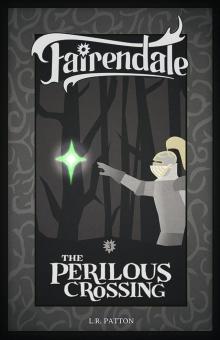 The Perilous Crossing
The Perilous Crossing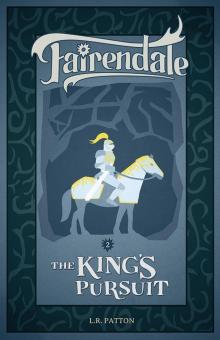 The King's Pursuit
The King's Pursuit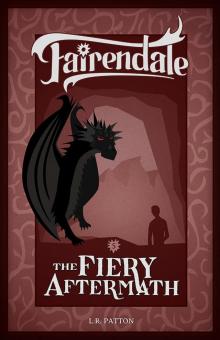 The Fiery Aftermath
The Fiery Aftermath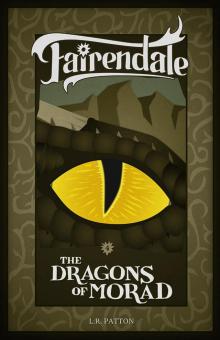 The Dragons of Morad
The Dragons of Morad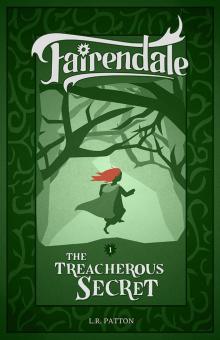 The Treacherous Secret
The Treacherous Secret